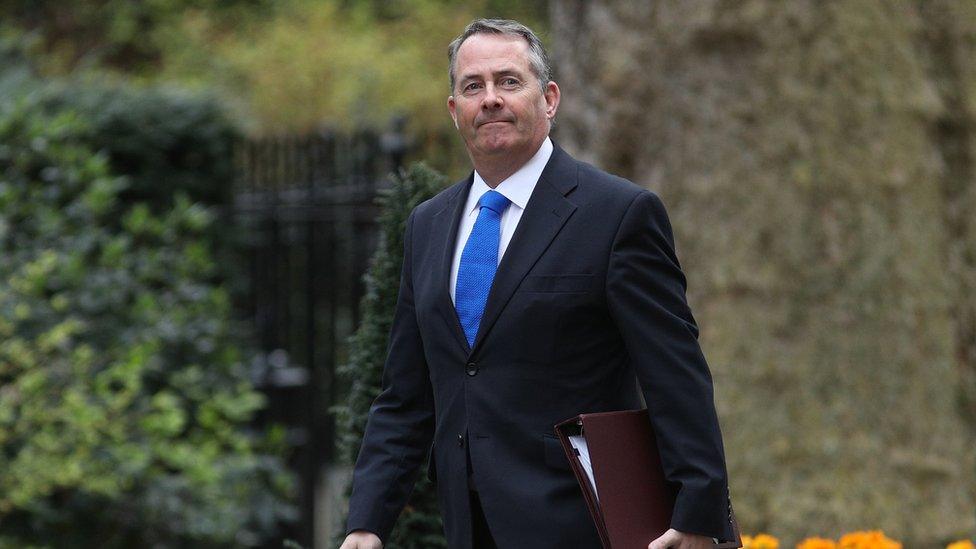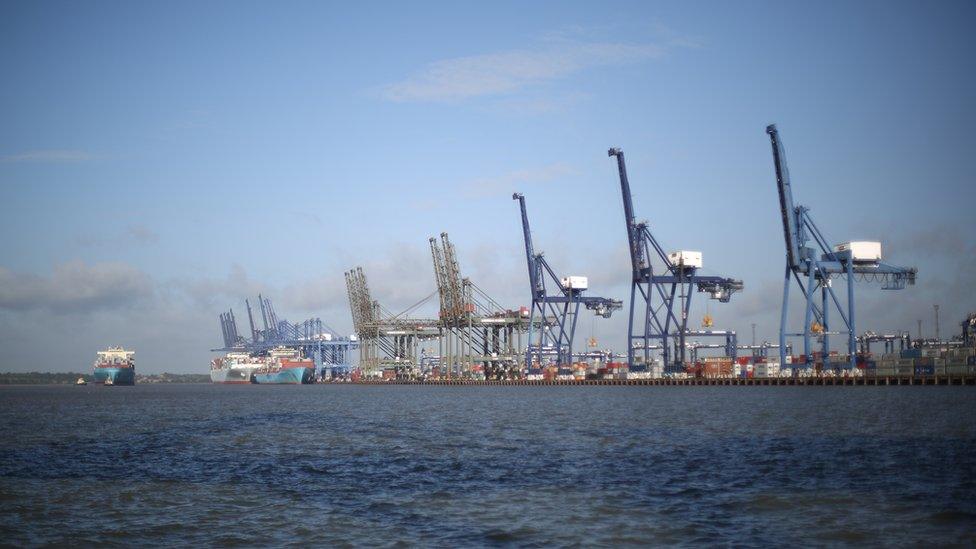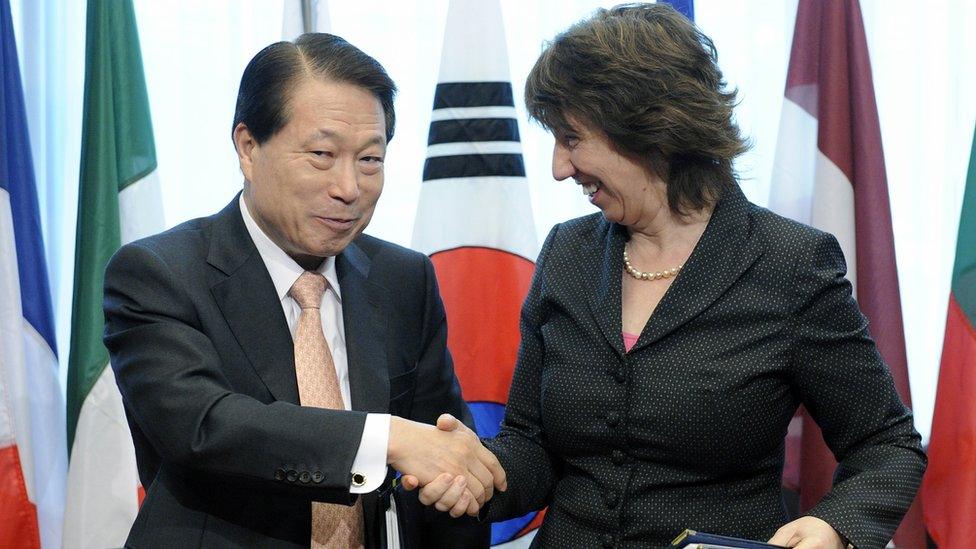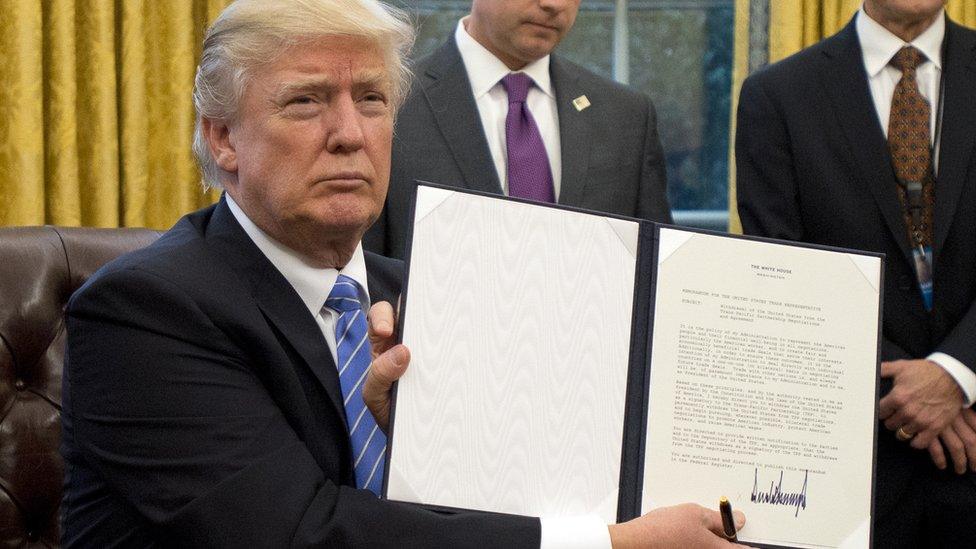Brexit: Liam Fox, transition and 'Project After'
- Published

Liam Fox arriving for cabinet ahead of the triggering of Article 50
Liam Fox's department is busier than it looks. The Department for International Trade has a huge amount to do to keep trade going smoothly, even if we stay in a customs union with the EU during our transition out.
But the trade secretary's department is also doing some emergency planning. What if the talks end acrimoniously? What if we need a radical Plan B? This planning has been dubbed "Project After" - a menu of options for life in that world. These are not firm proposals, but blue-sky "what-ifs" for a cliff-edge break with Europe.
These are radical - they include ideas like joining an Asia-focussed trade pact and dropping all our tariffs.
Planning for no-deal is not DIT's most pressing engagement, however - its key priority for now is making our transition out of the EU as seamless as possible.
Making transition work
At the moment, as the prime minister set out today in the Commons, the government intends that there should be a transitional deal which allows us to stay in the EU single market and join a customs union with the EU. This is likely to last for two years or so - and an important part of making that work will fall to DIT.
The point of staying attached to the EU during transition is that it would reduce the hassle involved in UK-EU trade so business would not face a sudden shock on the day after we officially leave the union. It would also mean that countries with EU trade agreements could keep selling us goods on the same terms as before.
So a South Korean-made car could be sold here much as though we were still in the EU. However, the reverse will not automatically be true. Even if we stay within the customs union, we will not be able to export to Korea under the terms of the EU-Korea deal. We would need a separate, bespoke deal with Korea for that during the transition period.

Felixstowe - Britain's biggest port
Third-party trade deals
This is why Mr Fox has spoken about having around 40 free trade agreements ready to go, external on the day after Brexit. These are agreements the EU has with third parties, which cover 60 or so countries. He would like to replicate them - basically, cut-and-paste the terms into a temporary bilateral deal - to avoid transition bumps on day one after Brexit in March 2019.
Those 60-odd countries estimate they receive about $55bn of goods from the UK at the moment. The largest national markets covered by these deals, accounting for around $35bn of goods exports, are Switzerland, Norway, Canada and Korea.
If the agreements are not transferred to the UK, this is likely to cause a dent in that trade - and some of our services trade. Without new deals, some tariffs will rise and, in addition, exports may face regulatory or commercial barriers to getting their products to market.
It may also mean losing potential for future growth: the Canadian deal has only just come into force so has not yet shaped British industry. The Korea deal contains provisions to allow improved access to our financial services sector.
The government told Newsnight today that it remains committed to trying to replicate all 40, but officials with knowledge of progress have told Newsnight that they do not expect to be able to do so. The department is advising ministers to focus their fire on a small number of deals - perhaps as few as four.

Yu Myung-hwan, South Korean minister of foreign affairs and trade, shakes hands with Baroness Ashton in May 2010, then the EU's high representative, at the conclusion of the EU-Korea deal
Limits to what is possible
There are lots of reasons for scepticism.
We, ideally, would have these deals ready to deploy by the time transition starts. But our negotiating partners may also see little purpose in rushing. After all, if we stay inside the customs union, they will still be able to access our market on close to current terms until transition ends. In some cases, including Korea, rushing might make no sense: the EU deals are not considered a great success for them.
Some treaties may also be politically contentious: a treaty with Israel will be a rallying point for the so-called "BDS" movement, which was quite visible at the Labour conference, and which seeks to boycott the Jewish state. The negotiations with Zimbabwe may also throw up some political problems.
There's another wrinkle, too. Even if we manage these issues, we are almost certain not to resolve problems with what is known as "rules of origin".
To sell a car to Korea under the terms of the EU-Korea deal requires 55% of the content to be EU-made. When we leave the EU, our contribution will not count to that EU-made total, even if we strike a parallel deal with Korea. That will give an incentive for EU-based automakers to switch production to the continent, to make sure that their goods still qualify for the EU-Korea deal.
A big task - but that is not all that DIT has to do.
'Project After'
What about those emergency plans? In common with the rest of government, DIT is considering life without an EU deal. This line of work has been dubbed "Project After".
One of the ideas under consideration is joining the Trans-Pacific Partnership - a putative trade area of Australia, Brunei, Canada, Chile, Japan, Malaysia, Mexico, New Zealand, Peru, Singapore and Vietnam (the US withdrew earlier this year). Thought has, separately, been given to joining the North American Free Trade Area - the trade area consisting the US, Canada and Mexico.
There are significant problems with both ideas - TPP is still on the operating table after the US's withdrawal. NAFTA is hardly stable either. And the political choices required to make them work would be brave - but that's an intrinsic factor in trade policy that Westminster has yet to grapple with. There are trade-offs everywhere.

President Trump signs an executive order withdrawing from TPP
For example, one obvious issue with both is that they contain provisions to allow foreign investors to sue governments for damages in the event that a capricious policy change costs them money. In another context - the EU-US negotiation of the trade deal known as "TTIP" - this type of provision was opposed widely on the British left.
Unilateralism
Within "Project After", however, there are other ideas. These include unilateral free trade: dropping our own tariffs. This is an idea that has some defenders in British politics because it would reduce import prices for Britons. Mr Fox recently cracked a joke in a meeting about "the c-word" in trade - "consumers".
Unilateralism, however, is not unproblematic. The promise of a targeted reduction in our tariffs is a chip we can use in negotiations to get other people to open themselves to us. Given that we are a service-heavy economy with strengths in heavily regulated sectors, using the offer of lowering our tariffs on goods to get past non-tariff barriers is an obvious negotiating strategy for us. Removing our tariffs up-front will weaken our position.
And the politics of unilateralism are rough - if we drop steel or agriculture tariffs, for example, it will create a lot of losers.
"Project After" also suggests what is, in effect, a halfway house on that idea: we could set up "Free Ports". That is to say, we could move our customs border back from our waterfronts. So you would only pay duty once goods left a harbour, not when they were landed. You could then create duty-free and tax-free hubs. It is a way to have a bit of unilateral free trade, but not overall.
A CPS paper by Rishi Sunak MP, external has even suggested we could subsidise companies to set up in free ports, and suggested they could be major manufacturing hubs. But there are problems with this - it's not clear how far our trading partners would allow this to go. Subsidies for exporters - however you dress that up - are not something the world of trade is relaxed about.
The Department for International Trade told Newsnight: "We are confident that we will find a deal that works for Britain and Europe too. But it is our responsibility as a government to prepare for every eventuality, and that is what we are doing."